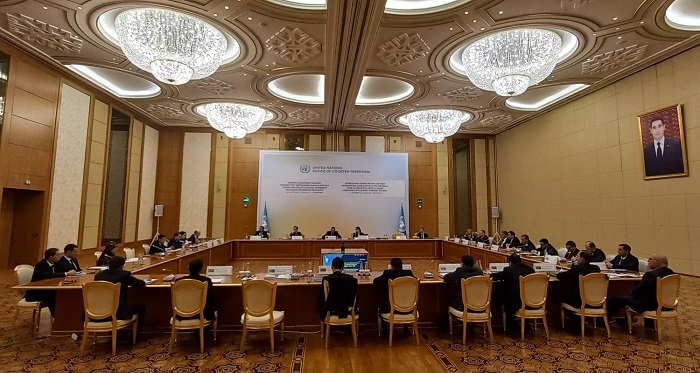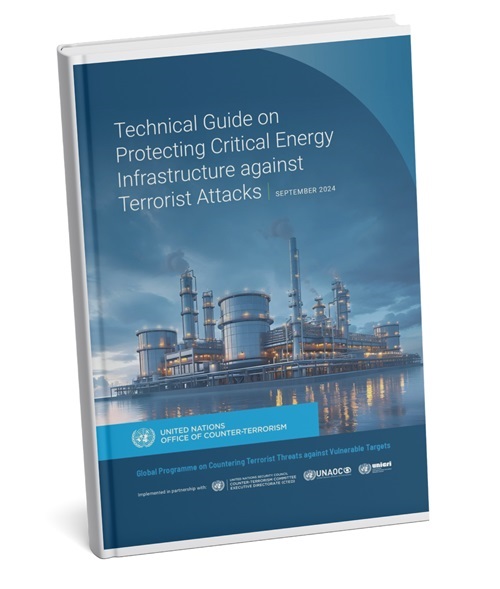On 11-12 November 2024, an International Expert Meeting and the First International Launch Event of the Technical Guide on Protecting Critical Energy Infrastructure against Terrorist Attacks” was held in Ashgabat.
The event was organized by the Government of Turkmenistan together with the United Nations Office of Counter-Terrorism (UNOCT) and the Government of the Russian Federation.
The two-day event was aimed at raising awareness of threats to energy infrastructure, engaging international experts to discuss best practices in this area. This meeting brought together international experts, Member State representatives, and private sector stakeholders to dive into the guide’s core themes: recognizing emerging threats, enhancing resilience, and strengthening response mechanisms.
Participants engaged in thematic sessions covering areas such as national approaches to counter terrorist threats to critical infrastructure, tailored protection strategies for traditional and renewable energy facilities, and methods for fostering public-private collaboration.
It was emphasized that the UN General Assembly Resolution of 19 December 2023 “The Key Role of Reliable and Stable Energy Connectivity in Ensuring Sustainable Development” adopted upon the initiative of Turkmenistan provides for consolidation of efforts of the international community in overcoming energy crises, as well as calls for ensuring reliable and stable cross-border supplies of energy resources.
The UN Global Program to Counter Terrorist Threats against Vulnerable Targets implemented jointly with a number of international organizations, has been supporting Member States since 2021 to build their capacity, develop expert networks and identify best practices in critical infrastructure protection.
This international event held in Ashgabat was also the First International Launch Event of the Technical Guide on Protecting Critical Energy Infrastructure against Terrorist Attacks.
UNOCT: Technical Guide on Protecting Critical Energy Infrastructure against Terrorist Attacks
Over the past decade, energy infrastructure has been targeted by terrorist activities more and more frequently. Recognizing the importance of protecting this sector, the United Nations has called on Member States to secure critical infrastructure through coordinated international standards and practices.
The General Assembly, in the eight review resolution of the United Nations Global Counter-Terrorism Strategy (A/RES/77/298) condemned “all terrorist acts against critical infrastructure, including critical energy facilities, and against other vulnerable targets, and urges all Member States to take necessary measures to prevent such attacks”. United Nations Security Council Resolution 2341 (2017) highlights the need for cross-border cooperation, particularly in protecting interdependent infrastructure such as energy facilities. Furthermore, United Nations Security Council Resolution 2396 (2017) urged Member States to address vulnerabilities and bolster infrastructure resilience in the face of evolving terrorist threats.
Technical Guide on Protecting Critical Energy Infrastructure against Terrorist Attacks is available here: https://www.un.org/counterterrorism/sites/www.un.org.counterterrorism/files/vulnerable_targets_energy_guide_en_web.pdf
Developed in collaboration with Member States, the United Nations Global Network of Experts on Vulnerable Targets, and United Nations Global Counter-Terrorism Coordination Compact entities, the UNOCT Technical Guide on Protecting Critical Energy Infrastructure against Terrorist Attacks serves as a practical, research-driven resource for Member States and key stakeholders. It compiles case studies and good practices from around the world, and recommendations that address both the operational and strategic aspects of critical energy infrastructure protection, including risk assessment, resilience-building, and international coordination.
The guide also incorporates lessons from UNOCT’s recent initiatives and offers guidance on integrating public-private collaboration and emerging technologies into energy security frameworks. ///nCa, 13 November 2024

